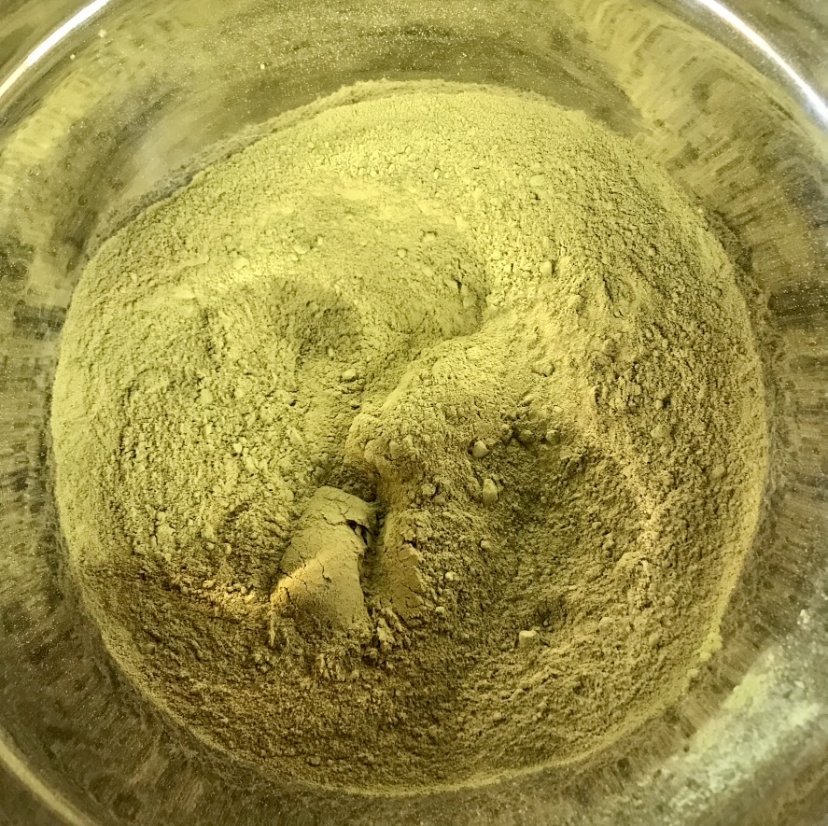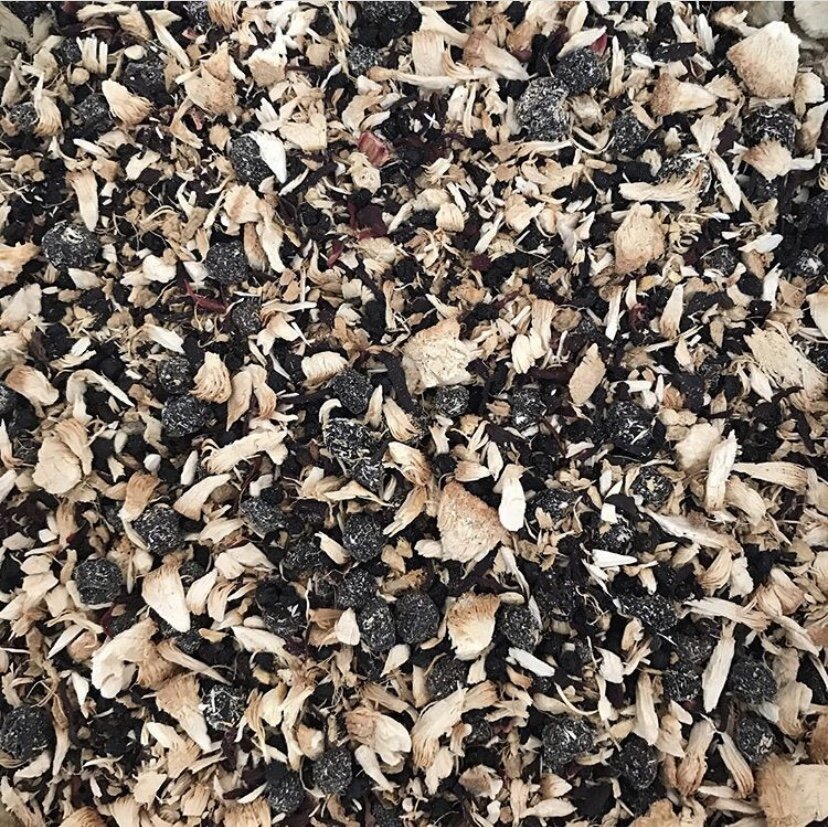Mushroom Teas: The Benefits of Shiitake, Maitake, Lion's Mane, Reishi, and Cordyceps
Introduction
Mushrooms have been revered for centuries in various cultures for their medicinal properties. With a wide range of bioactive compounds and therapeutic potential, certain medicinal mushrooms have retained and gained popularity as the most impressive for functionality. This article explores the health benefits associated with each of the five mushrooms Zoom Out Mycology makes teas with: Shiitake, Maitake, Lion's Mane, Red Reishi, and Cordyceps.
An array of Zoom Out Mycology mushroom teas on display.
1. Shiitake (Lentinula edodes)
Shiitake mushrooms (Lentinula edodes) are one of the top 3 most widely known and cultivated mushrooms. They are highly regarded for their immune-boosting properties and delicious umami flavor. Shiitake mushrooms are nutritionally rich and contain numerous minerals (Potassium, Manganese, Magnesium, Iron, and Phosphorus) and vitamins (pro-vitamin D2, vitamin B1, B2, B6, B12, and niacin). Shiitake mushroom contains bioactive compounds such as phenolics, polysaccharides, sterols, essential macro and micronutrients as well as others including antioxidants, dietary fiber, and ergosterol. Bioactive compounds like these can be helpful for maintaining good health and preventing diseases. For example, shiitake consumption has been shown to enhance immune function, reduce inflammation, and may also aid in reducing cholesterol levels, supporting cardiovascular health, and promoting healthy skin.
Our Shiitake Genmaicha blend has earthy and roasty notes from the toasted rice green tea (genmaicha tea) combined with the smoky and umami notes of the shiitake mushroom. This blend was formulated to be a mushroom lover's dream, almost serving as a meal in a cup! P.S. This is still a beverage (tea) and a caffeinated one at that so be mindful if you plan to use this blend for any cooking.
Shiitake Genmaicha mushroom tea in a blending bowl.
2. Maitake (Grifola frondosa)
Maitake mushrooms (Grifola frondosa) have long been recognized in traditional Chinese and Japanese medicine for their potential health benefits. This mushroom variety contains beta-glucans and polysaccharides that have immune-modulating effects, helping to regulate immune responses. Maitake mushroom tea is also known for its potential to support healthy blood sugar levels, promote weight management, and possess anti-cancer properties. Additionally, it may have adaptogenic properties that assist the body in managing stress.
Our Maitake Mint blend which has nutty notes from the Maitake mushroom combines with refreshing peppermint and gut or menstrual cramp soothing fennel. This blend was formulated for digestive support and serves as an excellent after meal pick me up thanks to digestive stimulation from gunpowder green tea leaves.
Maitake Mint mushroom tea in a blending bowl.
3. Lion's Mane (Hericium erinaceus)
Lion's Mane mushrooms (Hericium erinaceus) have received special attention for their unique appearance (they kind of look like a cascading waterfall) and cognitive health benefits. The bioactive compounds in Lion's Mane, including hericenones and erinacines, have shown promising effects on brain health. When brewed into tea, Lion's Mane mushrooms may support brain function, improve memory and focus, and enhance overall mental well-being. This mushroom tea is also believed to promote nerve regeneration and help alleviate symptoms of anxiety and depression.
Our Berry Brain blend which features Lion's Mane mushrooms can be described as bold, gingery, and fruity. Some people compare the flavor of Lion's Mane to that of seafood, particularly lobster or crab. The texture is often described as tender and slightly chewy, similar to cooked scallops. When brewed into tea, Lion's Mane mushrooms impart a pleasant earthy and slightly nutty taste. Overall, Lion's Mane mushrooms offer a pleasant and intriguing flavor and pair perfectly with the ginger berry herb selection.
Berry Brain mushroom tea (with Lion’s mane) in a blending bowl.
4. Red Reishi (Ganoderma lucidum)
Red Reishi mushrooms (Ganoderma lucidum) have been revered as the "mushroom of immortality" in traditional Chinese medicine. Reishi mushroom tea contains triterpenes, polysaccharides, and antioxidants, which contribute to its numerous health benefits. Regular consumption of Reishi mushroom tea may help support immune function, reduce fatigue and stress, improve sleep quality, and promote liver health. Furthermore, Reishi mushrooms possess anti-inflammatory properties that may aid in managing chronic inflammation and associated diseases.
We make two Reishi blends, Reishi Red and Reishi Rose. The Reishi Rose has lots of Vitamin C and astringency which helps promote excellent skin health and immune system support. The Reishi Red is a bolder blend featuring lemon, hibiscus and ginger and offers cardiovascular support. Both blends support a gentle detox too!
5. Cordyceps (Cordyceps militaris)
Cordyceps mushrooms (Cordyceps militaris) are unique and fascinating, as they grow parasitically on caterpillar larvae in the wild. Cordyceps mushroom tea is derived from the fruiting body of the fungus and contains bioactive compounds like cordycepin and polysaccharides. This tea is often associated with increased energy, endurance, and athletic performance. Cordyceps mushroom tea may also support respiratory health, enhance oxygen utilization, improve immune function, and assist in maintaining healthy kidney function.
Our Citrusceps blend has earthy notes from the Cordyceps mushroom and has been paired with orange peel, lemon peel, turmeric root and lemongrass. This blend was formulated to promote energy and stamina support.
Citrusceps mushroom tea (with Cordyceps) atop a wooden plank with Citrusceps tea surrounding the tea tin in a natural outdoor setting.
Conclusion:
The health benefits of Shiitake, Maitake, Lion's Mane, Reishi, and Cordyceps teas are extensive and have been recognized in traditional medicine for centuries. These mushroom teas offer a natural and holistic approach to enhancing well-being and promoting optimal health. However, it's important to note that while medicinal mushrooms are generally safe enough to be considered a functional food, individuals should consult with a healthcare professional before incorporating mushroom teas into their routine, particularly if they have underlying health conditions or are taking medications. With proper guidance, harnessing the power of these mushrooms through tea consumption may contribute to a healthier and more balanced lifestyle.
Recommended literature review on this topic:
Venturella, G. et al., (2021). Medicinal Mushrooms: Bioactive Compounds, Use, and Clinical Trials. International journal of molecular sciences, 22(2), 634. https://doi.org/10.3390/ijms22020634





